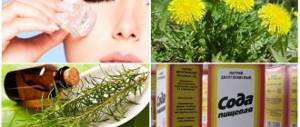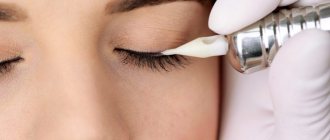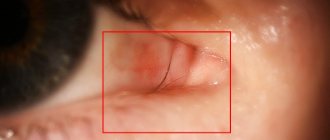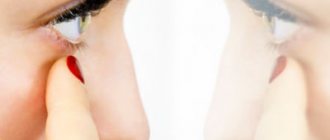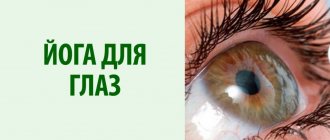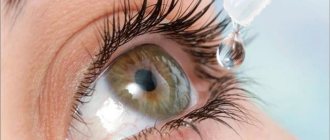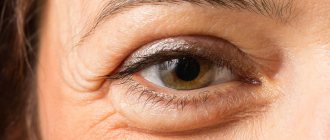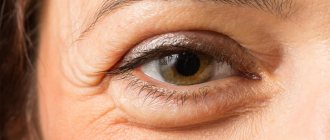Environmental degradation, polluted air, chemical additives in products and many other factors surrounding humans have led to allergies becoming a disease of millions. Compounds that cause such reactions have already reached 2 thousand in quantity. Some cause the eyes to itch and swell, which causes discomfort and other problems.
Doctors tell you how to quickly remove swelling of the eyes due to allergies, but you should remember that before starting treatment you need to identify the cause of this condition. In folk medicine there are many tips on how to treat swelling under the eyes, but each remedy has its own indications and contraindications, which also needs to be taken into account.
Emergency help
The main measure for allergic eye swelling is to stop contact with the irritating factor. You should then immediately begin the following steps:
- Internal administration or injection of an antihistamine (Suprastin, Tavegil or Diphenhydramine).
- Rinse the eyes with running water or chamomile decoction to prevent localized swelling. Similar actions help the eyes if the culprit of the swelling is an external factor.
- Drinking regime with a sufficient amount of clean water. This starts the active process of removing the substance that caused swelling from the body. For the same purpose, drugs with a diuretic effect are used.
- Taking activated carbon or other sorbent to reduce the effect of the allergen.
- Applying wet cloth wipes to the eyelids for itching and burning. Hot compresses should not be used!
Don't delay calling an ambulance!
Important! The active actions of the victim in the first hours of the manifestation of edema are very important, since swelling of the eyelids is quite capable of having serious consequences, spreading to the throat or nasopharynx.
Causes
In official medicine, allergic swelling of the eyes is called angioedema and belongs to the group of angioedema. The cause of the phenomenon in a child and an adult is a pathological reaction to an allergen that has entered the body. The mediators of the process are:
- medications, often containing iodine, and vitamin complexes;
- cosmetics containing allergy-provoking substances;
- food products, especially nuts, eggs, chocolate and seafood;
- household dust;
- volatile chemicals;
- animal fur, bird feathers;
- plant pollen.
In a child, swelling of the eye occurs due to an allergy to insect bites. It is possible that an adult may develop allergic swelling when wearing unsuitable contact lenses, after eye surgery, or in cold weather (cold allergy).
Important! Typically, allergic eye swelling is observed in people who are prone to other manifestations of allergies, including seasonal ones.
Causes of eye swelling in children
If a child experiences swelling of the eyelids and redness of the skin, the following factors could contribute to this:
- Mechanical damage.
- Diseases of a bacterial or viral nature.
- Allergies (to pollen, dust, food, feathers and fur of pets, cleaning products, etc.).
- Kidney pathologies.
- Intracranial pressure disorders.
- Heart diseases.
- Sleep disorders.
- Acute respiratory disease.
If the eyes are swollen, the child’s allergies may also be accompanied by symptoms such as increased lacrimation, runny nose, and cough. If complications occur, the face and throat swell.
Symptoms
Eye swelling due to allergies most often affects children and women. Harbingers of the phenomenon are headache and loss of strength. In a mild form, there is slight swelling of the eyelids, especially the upper ones. In severe cases, the eyes become so swollen that the palpebral fissure disappears completely.
Important! More often the phenomenon is one-sided. Swelling of the second eye appears gradually.
Other signs include:
- redness of the mucous membranes of the eyes;
- dry skin around the eyes;
- itching and burning of the skin of the eyelids, swelling;
- feeling of sand in the eyes, especially when blinking;
- lacrimation;
- photophobia.
Important! Discharge of pus during allergic eye swelling, in contrast to traumatic or inflammatory swelling, rarely occurs.
In the vast majority of cases, allergic eye swelling is accompanied by a number of additional symptoms:
- nasal congestion;
- rhinitis;
- sore throat;
- dry cough;
- difficulty breathing;
- skin rash.
Important! In some cases, allergic swelling of the eyes leads to an increase in intraocular pressure. If you do not respond to the symptom in time, a decrease in visual acuity or a complete loss of the ability to see may occur.
In a child, swelling of the eyes due to allergies is accompanied by the following symptoms:
- loss of appetite;
- slight increase in temperature;
- nausea;
- pale skin.
If swelling occurs for the first time, it can go away as quickly as it formed. With a certain tendency to allergies, the likelihood of relapse increases. After each relapse, the swelling becomes more pronounced, and the symptoms persist longer.
Diagnostics
Before removing swelling and relieving the condition, the patient must undergo the necessary diagnostics. This will avoid complications in the future and speed up the stabilization of the condition.
You need an examination and consultation with an allergist. It determines the type of allergy - whether it is inflammatory edema or conjunctivitis. Mandatory tests are prescribed:
- skin tests with allergens;
- scraping from the conjunctiva;
- eyesight check;
- donation of tear fluid for research. Based on its results, the number of eosinophils is determined;
- examination of the edges of the eyelids, eyelashes, cornea, conjunctiva.
Additionally, consultation with a dermatologist, gastroenterologist, and endocrinologist is necessary. Based on the test results, the conclusions of specialists, the allergist selects the necessary therapy.
Treatment
In addition to emergency assistance, in case of allergic eye swelling, you should act as follows:
- Find out the cause of the swelling and visit an allergist.
- Use antihistamines (Lecrolin, Allergodil, Cromohexal) and vasoconstrictor (Visin) eye drops.
Important! The effect of the products begins a few hours after use. Treatment cannot be continued for more than a month, otherwise addiction will occur.
- Use hormonal eye ointments that help relieve acute inflammation.
- Start taking oral antihistamines to relieve signs of allergies in the eyes and other parts of the body. Adults are usually prescribed Cetirizine, Suprastin, Zyrtec and Cetrin. If swelling is observed in children, consultation with a pediatrician is necessary. Doctors mostly prescribe Fenistil. The drug is approved even for infants.
Learn how to use antihistamine eye drops
When the eyes swell, they use not only medications. Sometimes it is advisable to pay attention to traditional medicine:
- lotions with gruel from cucumbers, raw potatoes or apples relieve inflammation and eliminate swelling;
- rinsing with a weak soda solution allows you to quickly relieve inflammation;
- In half an hour you can get rid of swelling using a compress from a used tea bag;
- rinsing with a decoction of dill seed helps relieve redness of the upper eyelids;
- lotions with birch sap relieve itching;
- a cooled piece of bread applied to the upper eyelid relieves burning and redness.
How and with what to relieve swelling from the eye at home after a blow, tears and allergies?
If puffiness of the eyes begins to appear too often, it is worth visiting a medical specialist to identify the factors causing its occurrence.
Causes of swelling of the eyes
The cause of eyelid tumors can be:
A distinctive indicator of an allergic reaction is rapid development and rapid completion.
An allergic reaction to an insect bite, cosmetic care products, various medications, any food products.- Inflammatory diseases of a viral or infectious nature - abscess, conjunctivitis, barley, ARVI, sinus diseases.
- Oncological diseases of the eyes.
- Mechanical damage to the skull, resulting in tissue swelling and hematomas. They arise due to traumatic damage to the blood vessels, which contributes to the effect of gravity on the blood and its movement to the area of the upper or lower eyelid.
- Hormonal imbalance, pregnancy. Swelling is possible before the start of the menstrual cycle, during puberty, and when taking hormones to treat any diseases.
- Hereditary predisposition. It is detected in parents and children at an early age when they are in good health and there are no other causes of eye swelling.
- Old age – loose skin, muscle weakness.
- Excess salt in the human body - edema occurs due to water retention in the human body.
- Visual strain – spending a long time doing paperwork, working on a computer, watching TV, driving a car in poor visibility, leading to disruptions in the blood supply to the areas of the upper and lower eyelids.
- Tears.
- Bad habits such as smoking and excessive alcohol consumption.
Read more about the causes of eyelid swelling here.
How to remove swelling from the eyes with high blood pressure?
If you have swelling of the eyelids due to high blood pressure, you should try the following methods:
. Apply the cubes to the problem area, slowly and carefully begin to make circular movements from the eyes towards the ears. For a better effect, you can add herbs that have a calming effect to the cube mold.
You can get rid of them using ice cubes- With its ability to draw excess moisture through the skin, cucumber is an effective method for removing puffy eyes. It is advisable to use pre-chilled vegetables. Cut two medium-thick circles and apply them to your eyes. Remove after a quarter of an hour.
Provided that there is no ice or fresh cucumbers among the available means, you can replace them with potatoes, which should be used in the same way as a cucumber.
How to get rid of swollen eyes due to allergies?
If the root cause of eye swelling is an allergic reaction, then anti-allergic drugs will be an excellent way to combat:
- Suprastin. A highly effective medication for the treatment of allergies. The result is visible almost immediately after use. The length of the course is from 5 days to a week. It is possible to stop using the drug after the swelling disappears.
- Cetrin. Available in the form of syrup and tablets. In both variations, the drug is used once a day, as it has a strong effect on the body.
- Cromohexal. Antiallergic eye drops. A large amount of water will help remove toxins from the human body faster, which will alleviate the condition and have a strong effect on the tumor.
Cromohexal
Tsetrin
Suprastin
How to quickly remove swelling from the eye after a blow?
To provide first aid after receiving a blow, it is necessary to apply ice or a cold metal object, such as a spoon, to the injury site. A container of cold water will also work.
Prevention
Following simple rules will help prevent eye swelling due to allergies:
- Balanced diet.
- Minimum use of cosmetics that can cause allergies.
- Eliminating potential allergens from the diet.
- Minimizing walks in the park during the flowering period of allergenic plants.
- The use of antihistamines for preventive purposes.
If you are prone to swelling of the eyes due to allergies, you should protect yourself from bright sun and strong winds by using sunglasses. If the pathological phenomenon is caused by wearing contact lenses, you need to visit an ophthalmologist and get instructions on further actions.
